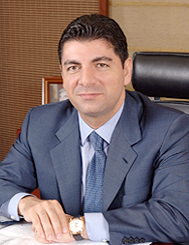Trustee Bahaa Hariri Pledges $15M for New Computing Institute
Interdisciplinary effort will aim at big issues

Computation has become academia’s lifeblood, coursing through virtually every field of study. Recognizing its importance, Boston University trustee Bahaa Hariri (SMG’90) has pledged $15 million for an institute that will support teams of University and outside experts pursuing what the institute’s director calls important, transformative interdisciplinary research.
The Bahaa Hariri Institute for Computational Science and Engineering is scheduled to be operating by next fall. It will not only propel discovery and innovation through the use of state-of-the-art computational approaches, but also will catalyze advances in the science of computing inspired by challenges from a multitude of disciplines, says founding director Azer Bestavros, a College of Arts & Sciences professor of computer science. The institute’s affiliated faculty will collaborate on research and educational initiatives targeting four broad application-based “clusters”: biology and medicine; physical science and engineering; social and management sciences; and the arts, communication, and education.
“Computational and data-driven methods play a crucial role in all four of the targeted application clusters,” says Bestavros. “Computational immunology research can dramatically advance how we come up with new vaccines. By fusing and mining geoscience data collected over time from multiple sources, we can tell what’s happening with the environment. Just think about how advances in social networking could influence business administration, sociology research, privacy legislations, and public policies.”
“We are extremely grateful for Bahaa Hariri’s visionary commitment in creating this institute at the nexus of modern computing and a range of critical applications,” says President Robert A. Brown. “Boston University has tremendous faculty and research activities in these areas and the creation of the institute will build the foundation for new interdisciplinary collaborations across these boundaries.”
“Supporting great research universities is an act of faith and a resilient commitment to contribute positively to the well-being of societies,” says Hariri, who has been a trustee since 2004. He is the son of assassinated Lebanese prime minister Rafik B. Hariri (Hon.’86), who was a BU trustee from 1990 to 2003, when he was named an honorary trustee. “My contribution today is a testimony to my father’s everlasting devotion to the pursuit of knowledge and an enduring hope to many around the world.”
After his graduation from Boston University, Hariri worked in his family’s construction and development company in Saudi Arabia until leaving to set up his own firm. He is founder and chairman of the Horizon Group, a property development and investment group operating in Jordan, Saudi Arabia, and Lebanon. He also founded Geneva-based investment portfolio company Exceed SA.
Robert A. Knox (CAS’74, GSM’75), chairman of the Board of Trustees, applauds the scale and scope of Hariri’s gift. “This is another example of extraordinary, pace-setting generosity on the part of the University’s trustee leadership,” says Knox. “Bahaa has once again shown us how generosity combines with vision to move BU forward. It’s an exciting development for us all.”
Andrei Ruckenstein, BU vice president and associate provost for research, says computing-based approaches have become critical for interpreting the ever-increasing amounts of data being collected in virtually all areas of human endeavor.
“This establishes a common need and also a common language among practitioners of very different disciplines,” says Ruckenstein. “Promoting literacy in this language of computing among our students and faculty outside of scientific disciplines, as well as with the public at large, is also an important goal of the Hariri Institute.”
The institute will support two types of synergistic activities: workshops and research projects. The workshops are defined by Ruckenstein as intense discussions of up to several months’ duration involving BU faculty, research staff, and students, as well as visiting experts. At any one time the institute will support both exploratory workshops and specific research projects.
Ideas being considered for the official institute launch include a three-month workshop on the role of computation in health care delivery and a pilot research project on green computing that would be connected with the Massachusetts Green High Performance Computing Center in Holyoke, which is being built by a consortium that includes BU, Harvard, MIT, Northeastern, and UMass, EMC Corporation, Cisco Systems, Inc., and the commonwealth of Massachusetts.
Other projects under discussion include computation and the arts, the role of computation in pedagogy, and quantitative social sciences and policy. “Computation is not only for scientists,” Ruckenstein says. “It impacts everything we do, how we communicate, and how our brains are wired—for better or for worse.”
Rich Barlow can be reached at barlowr@bu.edu.

Comments & Discussion
Boston University moderates comments to facilitate an informed, substantive, civil conversation. Abusive, profane, self-promotional, misleading, incoherent or off-topic comments will be rejected. Moderators are staffed during regular business hours (EST) and can only accept comments written in English. Statistics or facts must include a citation or a link to the citation.